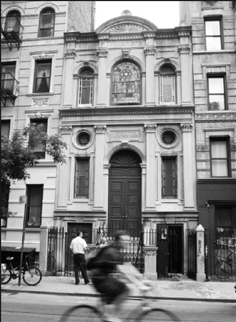By Albert Amateau
The board of a physically rundown E. Sixth St. synagogue built in 1910 voted earlier this month to replace it with a new six-story residential building that would also contain a synagogue.
The directors voted on July 7 to confirm a deal that would see the Kushner Companies demolish Adas Le Israel Anshei Meseritz, at 415 E. Sixth St., and build a new synagogue on the first two floors of the new building, which would have 10 apartments on the top four stories.
“This is the third developer we’ve spoken to in four years in the effort to save the shul, and we were really fortunate to find him,” said Brian J. Burstin, the attorney for the board of the synagogue, founded in 1892 by immigrants from Eastern Europe.
But a prominent member of the dwindling congregation has questions about the transparency of the deal with the developer, and his lawyer has asked the state attorney general, who oversees nonprofit groups in New York State, to look into the matter.
“I have concerns that many of the people who pray here have not been allowed to become members,” said William Rapfogel, whose father was a member and an officer of Anshei Meseritz for 50 years until the day he died in 1981.
Rapfogel is executive director of the Metropolitan Council on Jewish Poverty, a private service agency, and his wife, Judy, is chief of staff for Assembly Speaker Sheldon Silver.
Rapfogel’s two grown sons have been denied a voting membership on the board under a one-family/one-membership rule.
Unlike many East Village and Lower East Side synagogues that were established in converted tenements or former churches, Anshei Meseritz was built as a synagogue.
“This may be the best deal out there in the present real estate climate and I don’t want to be the one to destroy the best chance to preserve the shul in perpetuity,” Rapfogel said. “The neighborhood is changing and it’s a dwindling congregation. And to deny membership to new families in that situation is very troubling. Why not be more transparent and reach out to new people?”
Burstin said that Rapfogel could have made his points at the July 7 meeting, and he insisted that all members were welcome to participate in the affairs of the shul.
The deal with Kushner calls for the synagogue to retain ownership of the land, plus the first two floors where the new synagogue would be located, while the developer would have residual ownership of the residential part of the new building. In return, Kushner would pay the congregation $725,000.
Unlike many Lower East Side synagogues that moved into former churches or into converted old-law tenements, Anshei Meseritz was built as a house of worship by its congregation.
Andrew Berman, director of the Greenwich Village Society for Historic preservation, noted that Anshei Meseritz does not have landmark protection.
“While a six-story building may not be out of scale for the area, it would be a shame to lose this great piece of Lower East Side history,” he said. “I hope the congregation would consider a plan to keep the existing building and build on top.”
The deal with Kushner, however, calls for demolition of the existing structure and building anew from the ground up.
A spokesperson for the Landmarks Preservation Commission said the building was included in a survey of 200 buildings on the Lower East Side that the commission did in 2006. A former synagogue at 242 E. Seventh St., three blocks from Anshei Meseritz, has been calendared for a hearing and does have some protection against demolition.
“But we’ve determined that the building at 415 E. Sixth St. is not a priority right now,” the Landmarks spokesperson said.
Les Sussman, a resident of First Houses, three blocks away, who frequently worships at Anshei Meseritz, said this week that he had heard rumors of the proposal and was aware that efforts were being made to save the historic shul.
“It’s wonderful news if it means that the shul will be here for years to come,” Sussman said. He noted, however, that one member of the congregation “doesn’t want to see a jewel like this torn down.”
Nevertheless, at the July 7 meeting, seven members of the board voted to accept the deal, while two abstained and one did not return a ballot. At the meeting Joshua Kushner, 23, a recent Harvard graduate and a principal in the development company, told the board that he was glad to be part of a project that was so important to the community.
His brother Jared is owner of The New York Observer. His father, Charles, resigned from the firm in 2004 when he pleaded guilty in New Jersey to witness retaliation and tax and campaign violations, for which he served two years in jail.
Pesach Ackerman, Anshei Meseritz rabbi and a member of the synagogue board, said, “I came here 40 years ago, and I hope this means the shul will be here till the Messiah comes.”





































